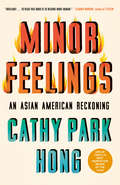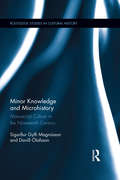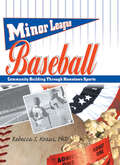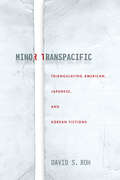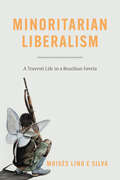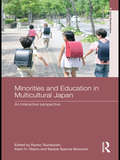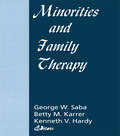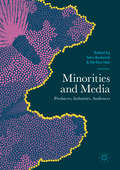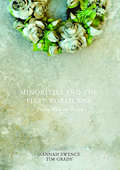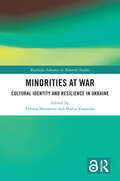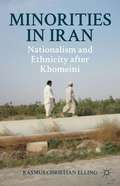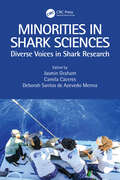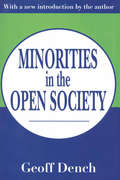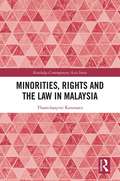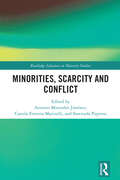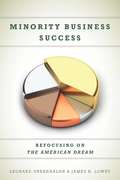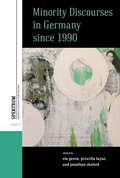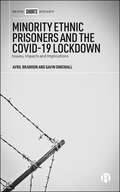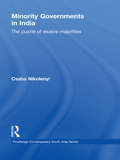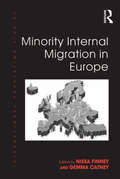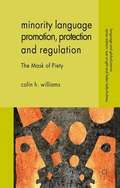- Table View
- List View
Minor Feelings: An Asian American Reckoning
by Cathy Park HongPoet and essayist Cathy Park Hong fearlessly and provocatively blends memoir, cultural criticism, and history to expose fresh truths about racialized consciousness in America. Part memoir and part cultural criticism, this collection is vulnerable, humorous, and provocative—and its relentless and riveting pursuit of vital questions around family and friendship, art and politics, identity and individuality, will change the way you think about our world. Binding these essays together is Hong’s theory of “minor feelings.” <P><P> As the daughter of Korean immigrants, Cathy Park Hong grew up steeped in shame, suspicion, and melancholy. She would later understand that these “minor feelings” occur when American optimism contradicts your own reality—when you believe the lies you’re told about your own racial identity. Minor feelings are not small, they’re dissonant—and in their tension Hong finds the key to the questions that haunt her. With sly humor and a poet’s searching mind, Hong uses her own story as a portal into a deeper examination of racial consciousness in America today. This intimate and devastating book traces her relationship to the English language, to shame and depression, to poetry and female friendship. A radically honest work of art, Minor Feelings forms a portrait of one Asian American psyche—and of a writer’s search to both uncover and speak the truth.
Minor Knowledge and Microhistory: Manuscript Culture in the Nineteenth Century (Routledge Studies in Cultural History)
by David Olafsson Sigurður Gylfi MagnússonThis book studies everyday writing practices among ordinary people in a poor rural society in the 19th and early 20th centuries. Using the abundance of handwritten material produced, disseminated and consumed some centuries after the advent of print as its research material, the book's focus is on its day-to-day usage and on "minor knowledge," i.e., text matter originating and rooted primarily in the everyday life of the peasantry. The focus is on the history of education and communication in a global perspective. Rather than engaging in comparing different countries or regions, the authors seek to view and study early modern and modern manuscript culture as a transnational (or transregional) practice, giving agency to its ordinary participants and attention to hitherto overlooked source material. Through a microhistorical lens, the authors examine the strength of this aspect of popular culture and try to show it in a wider perspective, as well as asking questions about the importance of this development for the continuity of the literary tradition. The book is an attempt to explain “the nature of the literary culture” in general – how new ideas were transported from one person to another, from community to community, and between regions; essentially, the role of minor knowledge in the development of modern men.
Minor League Baseball: Community Building Through Hometown Sports
by Frank Hoffmann Martin J Manning Rebecca S KrausExamine the big-league benefits of minor league baseball!The Minor League Baseball: Community Building Through Hometown Sports examines the role played by minor league baseball in hundreds of cities and towns across the United States. Written from the unique perspective of a sociologist who also happens to be an avid baseball fan, the book looks at the contributions minor league teams make to the quality of life in their communities, creating focal points for spirit and cohesiveness while providing opportunities for interaction and entertainment. The book links theory and experience to present a “sociology of baseball” that explains the symbiotic relationship which brings people together for a common purpose-to root, root, root for the home team.From the author: Minor league baseball is played across the country in more than 100 very different communities. These communities seem to share a special bond with their teams. As with all sports teams, there is a symbiotic relationship between the team and the city or town that it represents. In the case of major league professional sports, the relationship is often fueled by economic outcomes. On the minor league level, the relationship appears to go beyond mere money and prestige. Minor league teams occupy a special place in our hearts. We are more forgiving when they lose, and extremely proud of them when they win.Minor League Baseball: Community Building Through Hometown Sports is a detailed look at the connection between town and team, including: economic benefits (development strategies, community growth) intangible benefits (ballpark camaraderie, hometown pride) fan attachment and attendance (demographic variables, stadium accessibility, “home court advantage”) case studies of two Maryland minor-league franchises--the Class AA Bowie Baysox and the Class A Hagerstown Suns Minor League Baseball: Community Building Through Hometown Sports also includes an introduction to the organizational structure of the minor leagues, a history of each current league, and charts and tables on attendance figures and franchise relocations. This book is essential reading for sociologists, sport sociologists/historians, academics and/or practitioners in the fields of community sociology and psychology, and of course, baseball fans.
Minor Transpacific: Triangulating American, Japanese, and Korean Fictions (Asian America)
by David S. RohThere is a tendency to think of Korean American literature—and Asian American literature writ large—as a field of study involving only two spaces, the United States and Korea, with the same being true in Asian studies of Korean Japanese (Zainichi) literature involving only Japan and Korea. This book posits that both fields have to account for three spaces: Korean American literature has to grapple with the legacy of Japanese imperialism in the United States, and Zainichi literature must account for American interventions in Japan. Comparing Korean American authors such as Younghill Kang, Chang-rae Lee, Ronyoung Kim, and Min Jin Lee with Zainichi authors such as Kaneshiro Kazuki, Yi Yang-ji, and Kim Masumi, Minor Transpacific uncovers their hidden dialogue and imperial concordances, revealing the trajectory and impact of both bodies of work. Minor Transpacific bridges the fields of Asian studies and Asian American studies to unveil new connections between Zainichi and Korean American literatures. Working in Japanese and English, David S. Roh builds a theoretical framework for articulating those moments of contact between minority literatures in a third national space and proposes a new way of conceptualizing Asian American literature.
Minor White, Memorable Fancies
by Minor WhiteThe personal journals of one of postwar America&’s most influential photographers, published for the first timeOne of the most significant unpublished texts in the history of photography, Memorable Fancies is the daybooks of Minor White, an artist who played a leading role in shaping the practice of photography in postwar America. Begun in the early 1930s and taking its name from a series of dialogues in William Blake&’s The Marriage of Heaven and Hell, these writings are part diary, part photography manual, and part aesthetic treatise. Minor White, Memorable Fancies presents this work in its entirety for the first time, offering an intimate look at the ideas and interior life of one of the most important photographers of the twentieth century.In this beautifully illustrated volume, art historian Todd Cronan sheds light on White&’s guiding concerns and the connections between White&’s writings and his public practice as a photographer and influential publisher and teacher. White&’s journal is accompanied by an array of photographs by White as well as annotations that provide background and context, illuminating White&’s life and career while capturing a vibrant and inventive moment in the history of modern photography.Challenging our assumptions about photographic agency and the interplay between art and life, Minor White, Memorable Fancies engages deeply with the creative potential of photographic work, the nature and effect of artworks on viewers, and the formative role that chance plays in the production of photographs.Distributed for the Princeton University Art Museum
Minoritarian Liberalism: A Travesti Life in a Brazilian Favela
by Moisés Lino e SilvaA mesmerizing ethnography of the largest favela in Rio, where residents articulate their own politics of freedom against the backdrop of multiple forms of oppression. Normative liberalism has promoted the freedom of privileged subjects, those entitled to rights—usually white, adult, heteronormative, and bourgeois—at the expense of marginalized groups, such as Black people, children, LGBTQ people, and slum dwellers. In this visceral ethnography of Rocinha, the largest favela in Rio de Janeiro, Brazil, Moisés Lino e Silva explores what happens when liberalism is challenged by people whose lives are impaired by normative understandings of liberty. He calls such marginalized visions of freedom “minoritarian liberalism,” a concept that stands in for overlapping, alternative modes of freedom—be they queer, favela, or peasant. Lino e Silva introduces readers to a broad collective of favela residents, most intimately accompanying Natasha Kellem, a charismatic self-declared travesti (a term used in Latin America to indicate a specific form of female gender construction opposite to the sex assigned at birth). While many of those the author meets consider themselves “queer,” others are treated as “abnormal” simply because they live in favelas. Through these interconnected experiences, Lino e Silva not only pushes at the boundaries of anthropological inquiry, but also offers ethnographic evidence of non-normative routes to freedom for those seeking liberties against the backdrop of capitalist exploitation, transphobia, racism, and other patterns of domination.
Minoritarian Liberalism: A Travesti Life in a Brazilian Favela
by Moisés Lino e SilvaA mesmerizing ethnography of the largest favela in Rio, where residents articulate their own politics of freedom against the backdrop of multiple forms of oppression. Normative liberalism has promoted the freedom of privileged subjects, those entitled to rights—usually white, adult, heteronormative, and bourgeois—at the expense of marginalized groups, such as Black people, children, LGBTQ people, and slum dwellers. In this visceral ethnography of Rocinha, the largest favela in Rio de Janeiro, Brazil, Moisés Lino e Silva explores what happens when liberalism is challenged by people whose lives are impaired by normative understandings of liberty. He calls such marginalized visions of freedom “minoritarian liberalism,” a concept that stands in for overlapping, alternative modes of freedom—be they queer, favela, or peasant. Lino e Silva introduces readers to a broad collective of favela residents, most intimately accompanying Natasha Kellem, a charismatic self-declared travesti (a term used in Latin America to indicate a specific form of female gender construction opposite to the sex assigned at birth). While many of those the author meets consider themselves “queer,” others are treated as “abnormal” simply because they live in favelas. Through these interconnected experiences, Lino e Silva not only pushes at the boundaries of anthropological inquiry, but also offers ethnographic evidence of non-normative routes to freedom for those seeking liberties against the backdrop of capitalist exploitation, transphobia, racism, and other patterns of domination.
Minoritarian Liberalism: A Travesti Life in a Brazilian Favela
by Moisés Lino e SilvaA mesmerizing ethnography of the largest favela in Rio, where residents articulate their own politics of freedom against the backdrop of multiple forms of oppression. Normative liberalism has promoted the freedom of privileged subjects, those entitled to rights—usually white, adult, heteronormative, and bourgeois—at the expense of marginalized groups, such as Black people, children, LGBTQ people, and slum dwellers. In this visceral ethnography of Rocinha, the largest favela in Rio de Janeiro, Brazil, Moisés Lino e Silva explores what happens when liberalism is challenged by people whose lives are impaired by normative understandings of liberty. He calls such marginalized visions of freedom “minoritarian liberalism,” a concept that stands in for overlapping, alternative modes of freedom—be they queer, favela, or peasant. Lino e Silva introduces readers to a broad collective of favela residents, most intimately accompanying Natasha Kellem, a charismatic self-declared travesti (a term used in Latin America to indicate a specific form of female gender construction opposite to the sex assigned at birth). While many of those the author meets consider themselves “queer,” others are treated as “abnormal” simply because they live in favelas. Through these interconnected experiences, Lino e Silva not only pushes at the boundaries of anthropological inquiry, but also offers ethnographic evidence of non-normative routes to freedom for those seeking liberties against the backdrop of capitalist exploitation, transphobia, racism, and other patterns of domination.
Minorities and Education in Multicultural Japan: An Interactive Perspective (Asia's Transformations)
by Ryoko TsuneyoshiThis volume examines how Japan’s increasingly multicultural population has impacted on the lives of minority children and their peers at school, and how schools are responding to this trend in terms of providing minority children with opportunities and preparing them for the adult society. The contributors focus on interactions between individuals and among groups representing diverse cultural backgrounds, and explore how such interactions are changing the landscape of education in increasingly multicultural Japan. Drawing on detailed micro-level studies of schooling, the chapters reveal the ways in which these individuals and groups (long-existing minority groups, newcomers, and the ‘mainstream Japanese’) interact, and the significant consequences of such interactions on learning at school and the system of education as a whole. While the educational achievement of children of varying minority groups continues to reflect their places in the social hierarchy, the boundaries of individual and group categories are negotiated by mutual interactions and remain fluid and situational. Minorities and Education in Multicultural Japan provides important insights into bottom-up policy making processes and consciously brings together English and Japanese scholarship. As such, it will be an important resource for those interested in education and minority issues in Japan.
Minorities and Family Therapy
by Kenneth Hardy Betty Mackune-Karrer George SabaMinorities and Family Therapy highlights the work of experienced, sensitive clinicians who, along with minority families, have found creative solutions to the problems minority families present. Until now, the field of family therapy has paid little attention to the specific clinical needs and strengths of minority families. Without sufficient exploration and training, family therapists risk treating minority families from a narrow, incomplete perspective, filtering out their inner resources, values, legacies, history, and wisdom, and underestimating the influence of the social settings in which they live. This unique and highly valuable book explores how systems-oriented clinicians presently work with ethnic and racial minority families. The chapters cover a wide range of clinical issues including pitfalls of misunderstanding and discrimination, innovative strategies for treating drug abuse and AIDS, and skills needed in caring for particular minority groups, such as Native Americans, blacks, Latinos, and Asian Americans. The authors go beyond simply spelling out cultural similarities and differences. They provide clear, clinical suggestions to be applied in family and community contexts. Not just another book on ethnicity, Minorities and Family Therapy looks at families who, because of their race and cultural background, have had to struggle with racism, discrimination, limited access to health care, economic bankruptcy, and educational barriers. Written for family therapists and health care providers who work with minority families and look for creative alternatives to improve their care, this landmark volume is a celebration of the strengths that minority families demonstrate in coping with long-term adversity.
Minorities and Media
by John Budarick Gil-Soo HanThis book examines the relationships between ethnic and Indigenous minorities and the media in Australia. The book places the voices of minorities at its centre, moving beyond a study of only representation and engaging with minority media producers, industries and audiences. Drawing on a diverse range of studies - from the Indigenous media environment to grassroots production by young refugees - the chapters within engage with the full range of media experiences and practices of marginalized Australians. Importantly, the book expands beyond the victimization of Indigenous and ethnic minorities at the hands of mainstream media, and also analyses the empowerment of communities who use media to respond to, challenge and negotiate social inequalities.
Minorities and the First World War
by Hannah Ewence Tim GradyThis book examines the particular experience of ethnic, religious and national minorities who participated in the First World War as members of the main belligerent powers: Britain, France, Germany and Russia. Individual chapters explore themes including contested loyalties, internment, refugees, racial violence, genocide and disputed memories from 1914 through into the interwar years to explore how minorities made the transition from war to peace at the end of the First World War. The first section discusses so-called 'friendly minorities', considering the way in which Jews, Muslims and refugees lived through the war and its aftermath. Section two looks at fears of 'enemy aliens', which prompted not only widespread internment, but also violence and genocide. The third section considers how the wartime experience of minorities played out in interwar Europe, exploring debates over political representation and remembrance. Bridging the gap between war and peace, this is the ideal book for all those interested in both First World War and minority histories.
Minorities at War: Cultural Identity and Resilience in Ukraine (Routledge Advances in Minority Studies)
by Elmira Muratova and Nadia ZasanskaThis collection focuses on Ukraine’s ethno-cultural minorities who in recent years have undergone forced displacement, emigration, the destruction of familiar ways of life, and a transformation of identity and language behaviour. The book examines the impact of Russia’s war against Ukraine, which began with the annexation of Crimea and the war in Donbas in 2014. It shows what happens to the cultural identities of minority groups and considers the mechanisms and components of their resilience in times of crisis. Key themes addressed include minorities’ collective memory and coping strategies, mobilisation and humanitarianism, forced displacement, and the preservation of identity. While most works on the Russo-Ukrainian war focus on the international context and the causes of the war and its humanitarian consequences for the population of Ukraine and the region as a whole, this book seeks to mainstream the issue of ethno-cultural minorities, which is often neglected in the coverage of this type of conflict. The book will be of interest to academics, researchers and policy-makers working in the areas of Law, Political Science, Anthropology, Human Geography, Religious Studies and War and Peace Studies.
Minorities in Iran
by Rasmus Christian EllingBased on the premise that nationalism is a dominant factor in Iranian identity politics despite the significant changes brought about by the Islamic Revolution, this cross-disciplinary work investigates the languages of nationalism in contemporary Iran through the prism of the minority issue. This is particularly evident among intellectuals and state representatives concerned with how to tackle the mounting ethnic mobilization among minorities today. Through a close and contextualized reading of a unique and broad-ranging material in Persian, this book shows how the minority issue is crucial to the future of Iran.
Minorities in Shark Sciences: Diverse Voices in Shark Research
by Jasmin Graham Camila Cáceres Deborah Santos de Azevedo MennaMinorities in Shark Sciences showcases the work done by Black, Indigenous and People of Color around the world in the fields of shark science and conservation. Edited by three minority researchers, it provides positive role models for the next generation. Highlighting new and important research done in the fields of biology, ecology, and evolution, the book places emphasis on scientists with diverse backgrounds and expertise from around the world. The heart of this book is that community and minority voices are important (and have always been) to science regardless of diplomas/universities/accolades/western standards of academia. Despite the use of the term ‘Minorities’, most of the world’s population do not identify as white nor male, and in fact all "minorities" together comprise the global majority of humans. For those in these historically underserved and underrepresented demographics, it is meaningful to be highlighted and be given credit for their contributions. This book showcases to the world the many Black, Indigenous, People of Color, and LGTBQ+ scientists leading marine conservation, both in terms of scientific research and science communication. It has been shown in the literature that diversity in scientists creates diversity in thought, which leads to innovation. Strong minority voices are exactly what is needed to bring greater attention to the conservation of sharks, and this book illustrates innovative science by people who were historically excluded from STEM. It highlights the unique perspectives these scientists bring to their field that allow them to interact with stakeholders, particularly in the areas of conservation and outreach. As we continue to amplify these often-forgotten voices through research, outreach and engagement, we hope to stimulate innovation and transformative change in the field of shark conservation and marine science.
Minorities in an Open Society
by Geoff DenchMost accounts of ethnic and race relations in Western states are optimistic at heart.They assume that equal participation by minorities will be achieved because it is a "public good" from which citizens will benefi t. Social justice will prevail. In this topical and disturbing book, Geoff Dench challenges these idealistic commentaries, showing that in many instances they do not produce convincing analyses of the position of minorities. He suggests that analysts neglect to explore the web of real interests behind public affi rmations of commitment to integration.
Minorities, Rights and the Law in Malaysia (Routledge Contemporary Asia Series)
by Thaatchaayini KananatuThis book analyses the mobilisation of race, rights and the law in Malaysia. It examines the Indian community in Malaysia, a quiet minority which consists of the former Indian Tamil plantation labour community and the urban Indian middle-class. The first part of the book explores the role played by British colonial laws and policies during the British colonial period in Malaya, from the 1890s to 1956, in the construction of an Indian "race" in Malaya, the racialization of labour laws and policies and labour-based mobilisation culminated in the 1940s. The second part investigates the mobilisation trends of the Indian community from 1957 (at the onset of Independent Malaya) to 2018. It shows a gradual shift in the Indian community from a "quiet minority" into a mass mobilising collective or social movement, known as the Hindu Rights Action Force (HINDRAF), in 2007. The author shows that activist lawyers and Indian mobilisers played a crucial part in organizing a civil disobedience strategy of framing grievances as political rights and using the law as a site of contention in order to claim legal rights through strategic litigation. Highly interdisciplinary in nature, this book will be of interest to scholars and researchers examining the role of the law and rights in areas such as sociolegal studies, law and society scholarship, law and the postcolonial, social movement studies, migration and labour studies, Asian law and Southeast Asian Studies.
Minorities, Scarcity and Conflict (Routledge Advances in Minority Studies)
by Stavroula Pipyrou Antonio Montañés Jiménez Camila Ferreira MarinelliThis volume places scarcity as a defining aspect of minorities’ experience and as a tool to comprehend ongoing and unresolved societal friction and global environmental challenges, strategies for survival and reproduction of the status quo, and aspirational desires for social mobility. The book is an experimental collective intellectual project departing from conventional approaches to scarcity solely as a resource-based economic or demographic concept. Boldly, the book looks at the ways in which disadvantaged social groups navigate their lives through scarcity, and how these circumstances are endured, interpreted, accepted or challenged.In a thought-provoking turn, the book makes a novel contribution to minority studies by engaging with scarcity not only concerning resources but also emotion, memory and affect. In analysing scarcity as a multidimensional analytical framework and interrogating it from manifold angles, the book unpacks uncharted ramifications of debates around scarcity and opens new lines of enquiry.The collection will be a valuable resource for academics, researchers and policymakers working in the areas of law, political anthropology and sociology.
Minority Business Success: Refocusing on the American Dream
by Leonard Greenhalgh James H. LowryAuthors Leonard Greenhalgh and James Lowry chart a path for the full participation of minority businesses in the U.S. economy. Today, minorities are well on their way to becoming the majority of our workforce and a large part of our entrepreneurial endeavors; their full contribution is essential to national competitive advantage in a global economy. The beginning of this book summarizes demographic changes in America and shows why it's in the national interest to foster the survival, prosperity, and growth of minority-owned businesses. The authors outline why these businesses are vital to the solution to our current economic woes. Next, the book turns to what minority firms must do to take their place in major value chains, and, finally, the book examines what governments, corporations, and support organizations ought to be doing to foster minority inclusion. In total, Greenhalgh and Lowry lay out a new paradigm for developing minority businesses so that they can fully contribute to our national competitive advantage and prosperity.
Minority Discourses in Germany since 1990 (Spektrum: Publications of the German Studies Association #23)
by Ela Gezen, Priscilla Layne, and Jonathan SkolnikWhile German unification promised a new historical beginning, it also stirred discussions about contemporary Germany’s Nazi past and ideas of citizenship and belonging in a changing Europe. Minority Discourses in Germany Since 1990 explores the intersections and divergences between Black German, Turkish German, and German Jewish experiences, with reflections on the evolving academic paradigms with which these are studied. Informed by comparative approaches, the volume investigates social and aesthetic interventions into contemporary German public and political discourse on memory, racism, citizenship, immigration, and history.
Minority Ethnic Mobilization in the Russian Federation
by Dmitry P. GorenburgThis book explains how state institutions affect ethnic mobilization. It focuses on how ethno-nationalist movements emerge on the political arena, develop organizational structures, frame demands, and attract followers. It does so in the context of examining the widespread surge of nationalist sentiment that occurred through the Soviet Union and Eastern Europe in the late 1980s and early 1990s. It shows that even during this period of institutional upheaval, pre-existing ethnic institutions affected the tactics of the movement leaders. It challenges the widely held perception that governing elites can kindle latent ethnic grievances virtually at will to maintain power. It argues that nationalist leaders can't always mobilize widespread popular support and that their success in doing so depends on the extent to which ethnicity is institutionalized by state structures. It shifts the study of ethnic mobilization from the whys of its emergence to the hows of its development as a political force.
Minority Ethnic Prisoners and the COVID-19 Lockdown: Issues, Impacts and Implications
by Gavin Dingwall Avril BrandonIf prison regimes had continued as normal during the COVID-19 lockdown, social distancing would have been impossible. Therefore, sweeping restrictions were imposed confining prisoners to their cells, cancelling communal activity and prohibiting visits from family and friends. This insightful book identifies the risks posed by prison lockdowns to minority ethnic prisoners, foreign national prisoners and prisoners from Traveller and Roma communities across the United Kingdom and the Republic of Ireland. It documents the unequal impacts on their mental and physical health, feelings of isolation and fear, access to services and contact with visitors. The legacy of the lockdown will be profound. This book exposes the long-term significance and impact on minority ethnic prisoners.
Minority Governments in India: The Puzzle of Elusive Majorities (Routledge Contemporary South Asia Series)
by Csaba NikolenyiIndia's national parliamentary elections typically result in the election of majority parliaments and the formation of a single-party majority government. However, India’s national party system has changed beyond recognition since the parliamentary elections of 1989. The Congress Party has lost its dominant party status; the number of political parties that contest elections, win seats in parliament and gain cabinet portfolios have increased; minority governments and cabinet instability have become regular features of parliamentary politics. This book addresses each of these aspects of party system transformation in India by applying the analytical techniques of rational and social choice theory. Challenging conventional wisdom, the book argues that the number of parties in India has increased as a result of the unexpected consequences of the constitutional amendment of 1985 that was conceived to curtail party defections. Although the Congress Party no longer dominates the new multi-party system, it still retains a pivotal role in deciding which coalitions may form viable and stable minority government. The Indian case study is theoretically driven and it is readily comparable with other parliamentary federations where minority governments are often formed, such as Canada, and the book finds that these processes are also present in the sub-national party systems of the states, however, with greater variation.
Minority Internal Migration in Europe (International Population Studies)
by Gemma CatneyImmigration is a major component of population change for countries across Europe. However, questions remain about where immigrants go after they arrive in a new country. What are the patterns of internal migration of minorities (immigrants and their descendants), and what are the causes and implications of these flows? Migration within a nation state is a powerful force, redistributing the population and altering the demographic, social and economic composition of regions, cities and neighbourhoods. Yet relatively little is known about the significance of ethnicity in migration processes, or how population movement contributes to immigrant and ethnic integration. Minority internal migration is an emerging field of academic interest in many European countries in the context of high levels of immigration and increased political interest in inter-ethnic relations and place-based policies. This book brings together experts in the fields of migration, ethnicity and diversity from across Europe to examine patterns of residential mobility of minorities, and to synthesise key themes, theories and methods. The analyses presented make important contributions to theories of migration and minority integration and may inform policies that aim to respond to local population change and increasing diversity. The conclusions of the book form an agenda for future research on minority and immigrant internal migration in developed societies.
Minority Language Promotion, Protection and Regulation
by Colin H. WilliamsThis is an analysis of the promises and contradictions surrounding contemporary minority language policy. It draws on theoretical and real-world perspectives and interviews with key players within European institutions together with field work undertaken principally in Ireland, Scotland, Wales, the Basque Country, Catalonia and Canada.
